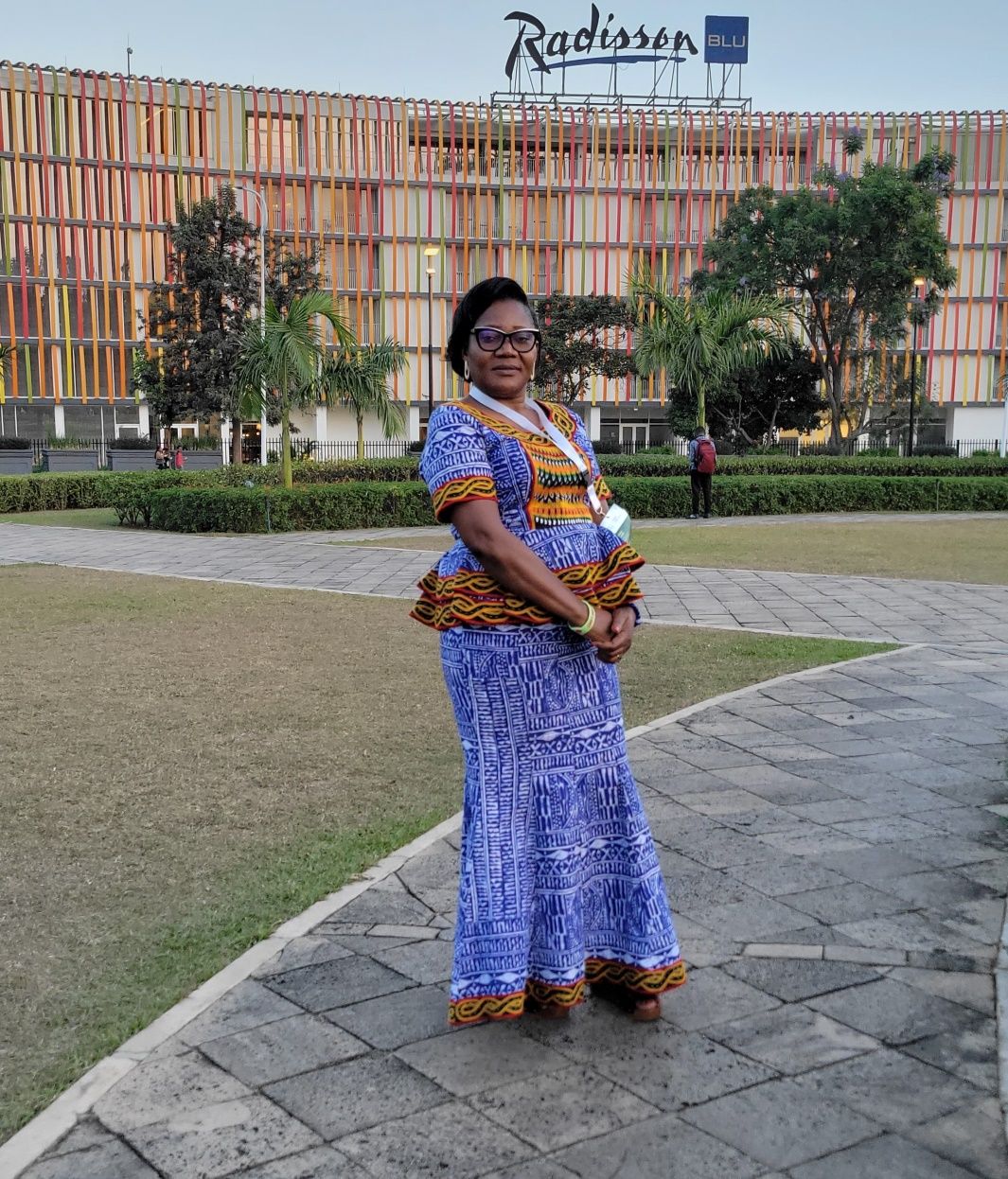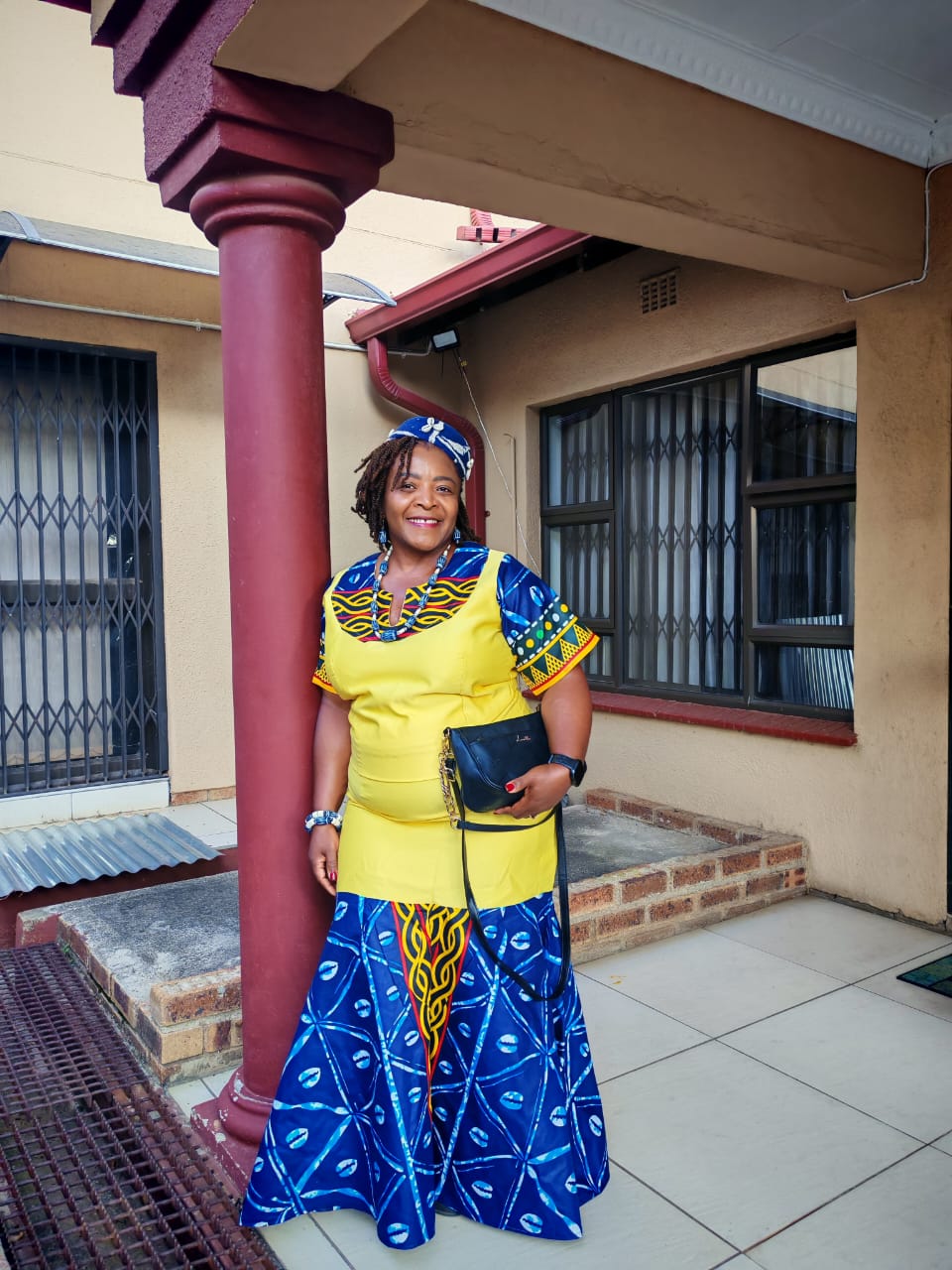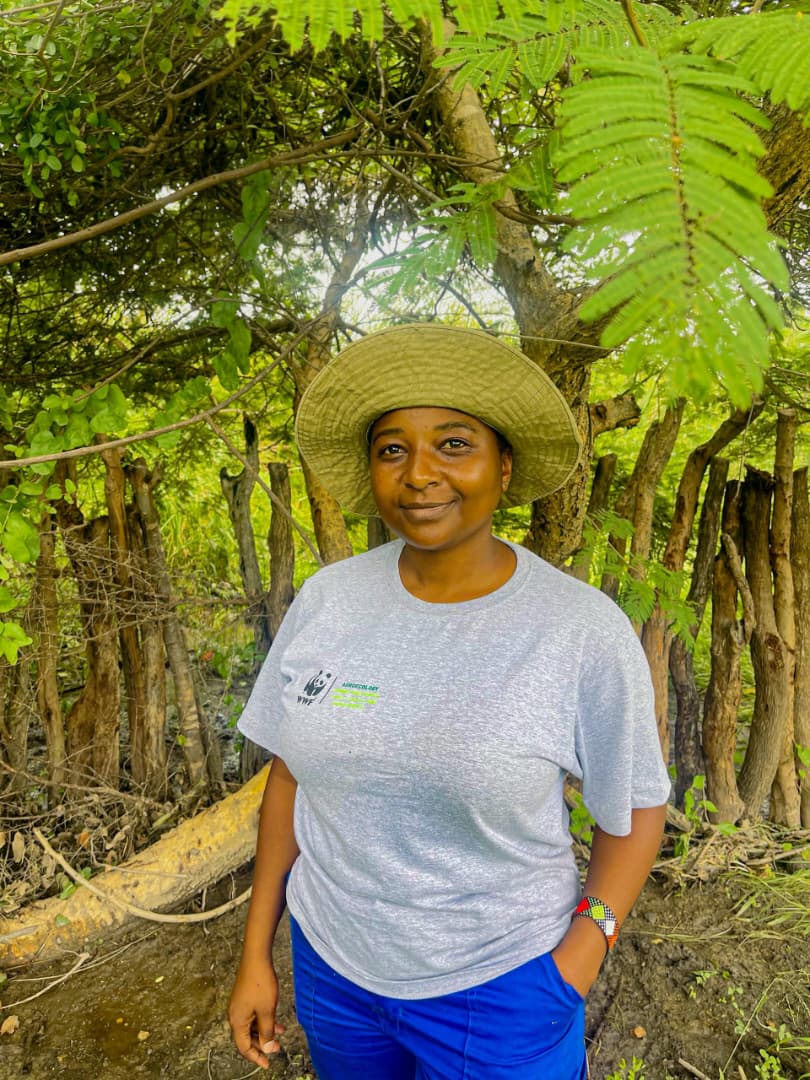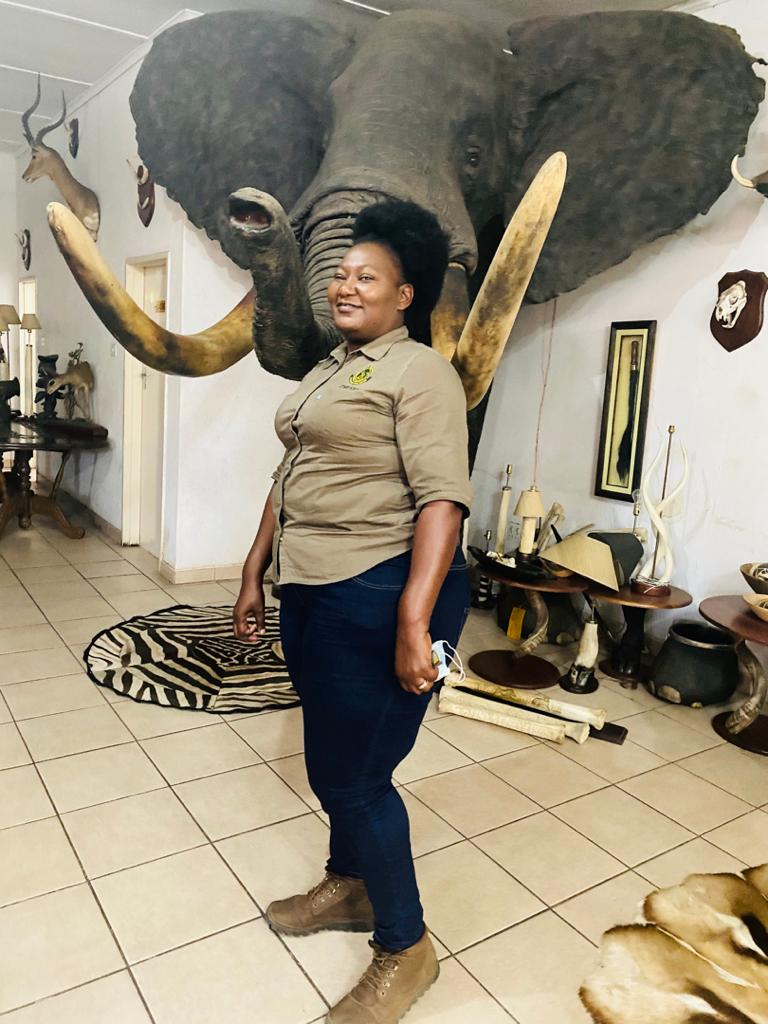This interview is part of a series profiling the stories of the 2024 WE Africa leadership programme fellows, African women in the environmental conservation sector who are showing up with a strong back, soft front, and wild heart.
***
Pricelia Tumenta never really grew up in a home—at least, not in the conventional way that most people imagine a home to be. Her parents’ love was something she felt only briefly, a fleeting memory from her infancy. What followed was not a childhood but a battle to survive.
In her own words, “the grace of God” is what carried her through.
But behind those words lies a story of a spirit that refused to break.

Throughout our conversation, her voice is steady, but her eyes betray the weight of years gone by.
This is the story of a woman who, by all indications, was dealt a losing hand from the get-go. But she didn’t fold. She pushed forward. She survived. And today, she is winning—on her terms.
***
Pricelia was born into a complex family. Her father was a polygamist, and her mother entered that world as either the third or fourth wife—Pricelia isn't quite sure which. Her mother already had two daughters when she married her father. She came from a Christian background. Her father’s side of the family held traditional religious beliefs. They opposed Christianity. The stage was set for conflict from the very beginning.
“My mother used to take me to church, and my grandfather from my father’s side hated it. He fought her for it.”
The pressure on her mother mounted until she couldn’t take it anymore. She left the marriage while Pricelia was still breastfeeding.
Her father was furious.
He dragged her mother to court, demanding that she return the bride price. It was repaid, but the ruling determined that once Pricelia was weaned, she would be taken back to her father’s house.
This was precisely what happened. Her father took her away from her mother and placed her in the hands of his other wives—a home filled with stepmothers who saw, in Pricelia, the face of a woman they despised.
“They dealt with me,” Pricelia says. “I remember one of them telling me that I was a nothing, a bastard who was bringing confusion into a home that never wanted me in the first place.”
One of her stepmothers, however, was kind. Pricelia clung to her as if her life depended on it, which, in many ways, it did. “I followed her everywhere,” Pricelia says. “One day, as she was crossing a big stream on her way to the farm, she stopped, turned around, and saw me. If she had gone on without turning, I might have struggled to cross the stream, and that could have been the end of me.”
***
Pricelia’s father found construction work in the city, bundled up Pricelia, her step-siblings and their mothers, and left the village. While in the city, he married another (fifth) wife. She bore him two children, and the chaos in the household reached fever pitch.
Her father blamed his first two wives for the confusion and sent them packing—back to the village. Pricelia and one of her step-sisters were left in the care of the latest wife. Not long after, her father’s business collapsed and he went bankrupt. He abandoned his family and fled from Cameroon to Nigeria.
One day, the fifth wife packed up her things, gathered her two children, and left without a word. A seven-year-old Pricelia and her nine-year-old step-sister were left to fend for themselves. “She took everything and left me and my step-sister with just the bed and our dresses,” Pricelia recalls. “I was in Primary Three.”
It was the landlord who eventually alerted their older stepbrother, who came to their rescue.
He handed them over to a trader who transported goats between the village and the town. When they arrived in the village, Pricelia’s step-sister rejoined her mother. Pricelia’s grandfather refused to let her return to her mother. “I was told I belonged to my father’s house,” she says.
And with that decree, Pricelia ended up right back where it had all started, the same polygamous compound where she had been mistreated earlier on.
Her only way out was to succeed in school.
***
Every day, Pricelia walked an hour to primary school and an hour back home. Each step she took was in defiance of the voices of those who called her “a nothing”.
She finished first in her class.
Since there was no secondary school in the village, she was allowed to go and live with her mother in town. She would continue her studies from there. Life wasn’t easy. But then again, it never had been. But it was different. She was with her mother.
Pricelia's exceptional performance in school earned her a scholarship that covered her tuition fees. But she had to do more to stay in school. During the holidays, she would buy fresh groundnuts and hawk them in the streets. By the end of each school break, she would have saved enough to buy her school supplies.
After completing high school, Pricelia went to Nigeria to study Zoology. During her coursework, she visited a National Park for the very first time. And for the first time, amidst the wild, she felt truly connected to something larger than herself. “I felt at home,” she says.
Being at the university was also the first time she tasted freedom. “I could've easily gone astray,” she says. “I could have given excuses like, I’m not loved, and no one’s really looking out for me. But that didn’t happen. The fear and love of God kept me grounded.”
She credits her kind stepmother for helping her gain this outlook. “She didn’t go to church, but she instilled so many good values in me, and I’m so so grateful for that.”
After earning her Master’s Degree in Wildlife Management, Pricelia returned home. However, she struggled to find work. Her sister encouraged her to try her luck in Yaounde. Taking that advice, she moved to the capital, applied for jobs, and secured a position as a university lecturer. She has never looked back.
Today, she teaches Wildlife Ecology and Behaviour. However, her true passion is the conservation of large carnivores, especially the African lion. Her journey into this field began with a short course in Park and Wildlife Management, which included theoretical work in the Netherlands and fieldwork in Cameroon and South Africa.
Pricelia had a life-changing experience in South Africa at Pilanesberg National Park. The park team was monitoring lions with GPS collars when a lioness fell ill. Using radio telemetry, they tracked her, darted her, and assessed her health before giving her treatment.

“It was an incredible experience!” Pricelia recalls. “I had only seen things like that on National Geographic, but there I was, living it. I even took pictures with the lion while it was sedated. In that moment, I knew this was the kind of research I wanted to pursue.”
***
But life wasn’t ready to give Pricelia a break just yet. Amidst all her progress, she received devastating news—her sister had been diagnosed with a terminal disease. Her health declined rapidly, and she passed away two weeks later. The loss shook Pricelia to her core.
Her sister left a seven-year-old daughter behind, and without hesitation, Pricelia took on the responsibility of raising her. She supported the girl through secondary school and into university. But just as the young woman was beginning her first year, tragedy struck again. She died in a road accident. Pricelia says, through tears, that after that loss, she was never quite the same.
As she was still grappling with that grief, her biological mother—with whom she had built a fragile but growing relationship—fell ill. Pricelia cared for her until she, too, passed away.
Throughout these ordeals, Pricelia hid her pain and put on a brave face.
“I was so lost and didn’t know how to live a life of my own,” she confesses.
Then, she joined WE Africa. And that became her turning point.
***
“For a long time, I just wallowed in pain and self-pity. The things I’ve shared with you really affected my health, but I would just go to the hospital and take medication. I wasn’t addressing the deeper issue, which was my well-being. But then, when I joined WE Africa, my outlook started to change,” she says. “I didn’t take anything I was learning from the program lightly. I developed a ritual for my health. I now exercise at least three times a week, meditate, and practice gratitude regularly.”
“I’ve also felt motivated in ways I hadn’t before. For example, I’ve been a senior lecturer for about ten years but felt stagnated with everything that happened in my life. But with the push from WE Africa, I finally put my documents forward for a grade change to become an associate professor. I’ve also created my association, Lion Conservation and Research, where I aim to mentor young people—especially young girls—into becoming lion experts.”
Importantly, Pricelia acknowledges that changing someone who is already an adult with their own mindset is tough. But, for her, changing her outlook was a necessity. As she puts it, "The best thing a woman can do for herself is create her happiness corner."
I ask her to explain what this “happiness corner” means, practically speaking.
“It’s a space of joy in your life,” she says. “I hang out with women with shared values. We sing in church, have important conversations with each other, and participate in sports together. We also have common lunches at each other's homes every other Sunday. It's a chance to connect with our kids and each other and build and share our happiness. The other day, I suggested adding book reading to our circle. We can share books, sit over coffee and discuss them.”
I ask her to describe the woman she's becoming, and Pricelia reflects thoughtfully. "I am a resilient woman," she says, "But I am also learning that vulnerability is not weakness. I'm learning to express myself and live by my values, which are integrity, honesty and compassion.”
Leadership, she shares, was once just a title to her. But now she understands that true leadership begins with leading herself—being self-aware and emulating the values she holds dear. "I’ve grown to be more confident. I am clear on the direction I want to take. I am no longer the woman caught in self-pity."
“From grass to grace”. This is how Pricelia describes her journey. No words could be more fitting. Hardship and heartache threatened to bury her over and over again. But Pricelia refused to curl up and wither. Instead, she has chosen to own her story and use it to blossom into the strong and radiant woman she is.
And now? Well, there’s no stopping Pricelia Tumenta.
***
The following statement was written and shared by Pricelia Tumenta during her graduation from the WE Africa Leadership Program in December 2024:
What if I shine
What if I shine? Why not?
Something has been ignited within me. I have been on a transformative journey in WE Africa that has unlocked my hidden potential.
Enough of sitting in obscurity! Enough of living the scripts written by others! I show up for myself; I am enough. I am a work in progress, becoming an authentic and courageous leader who takes the podium to register my voice in the environmental sector in Africa.
As I shine and drop keys, other women are coming to my brightness for a greater environmental impact. I take care of myself and create a culture of well-being as I lead with my heart and my head.
I have to shine because no one can shine my shine!
Dr Pricelia Tumenta, WE Africa 2024 Fellow





